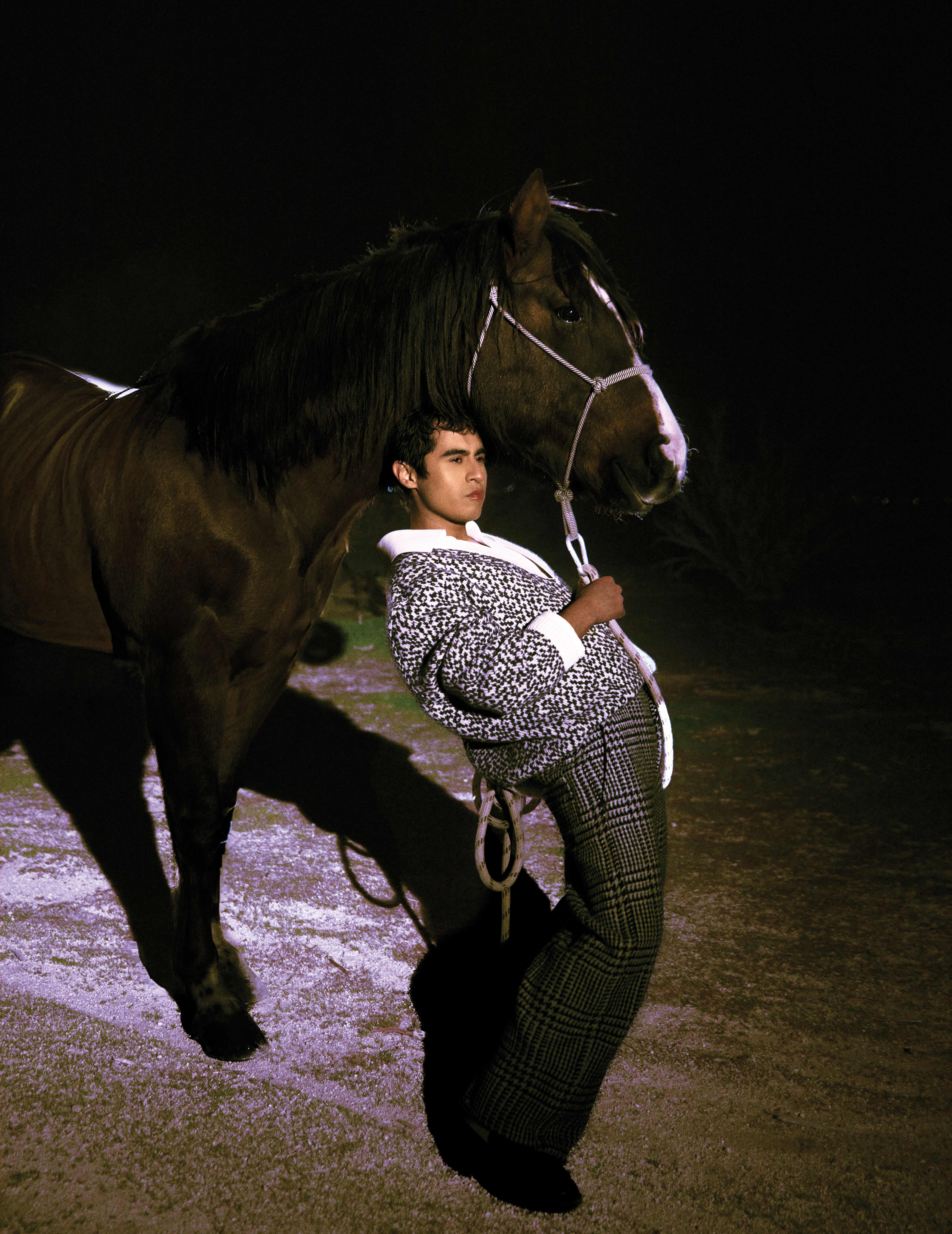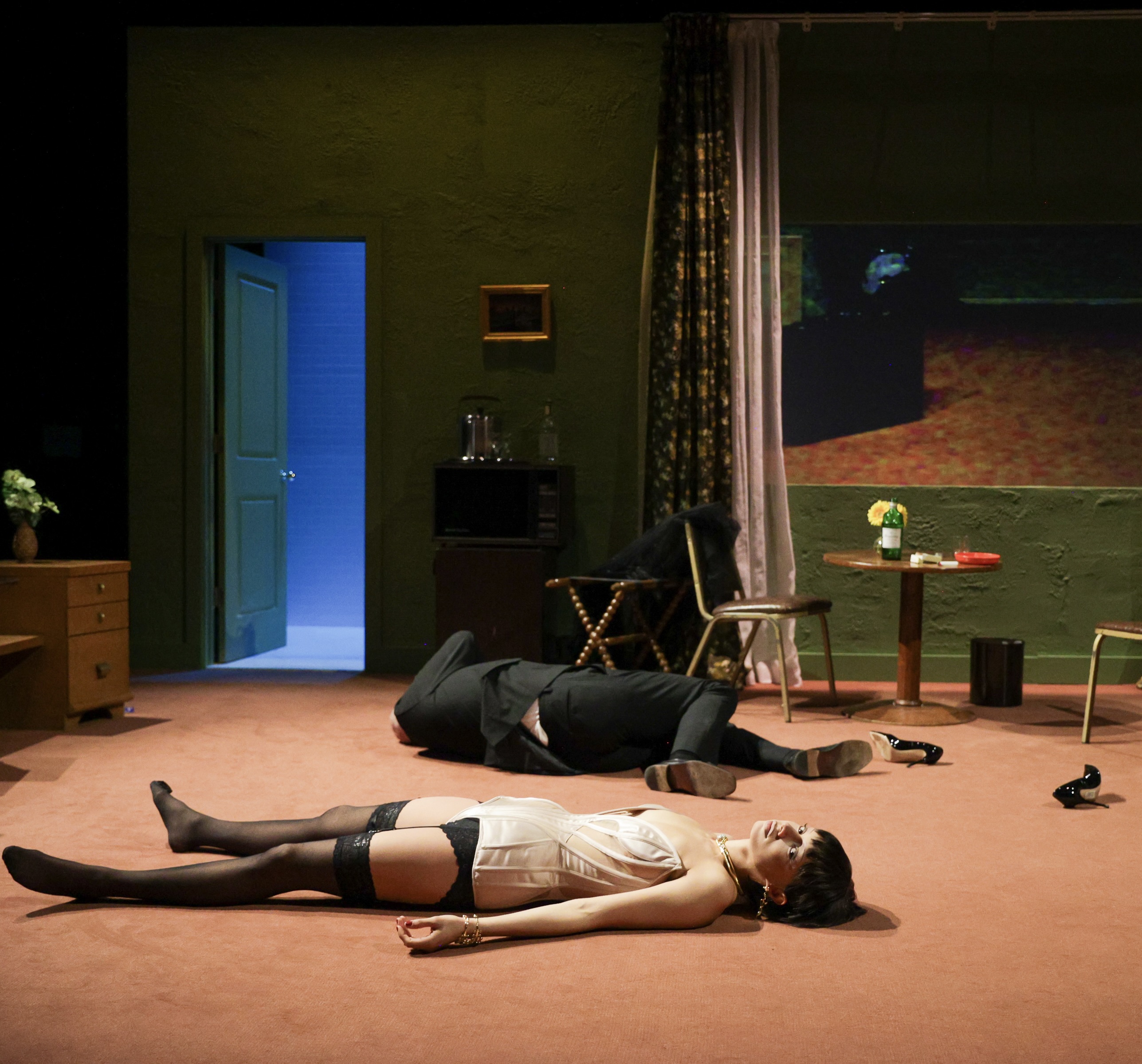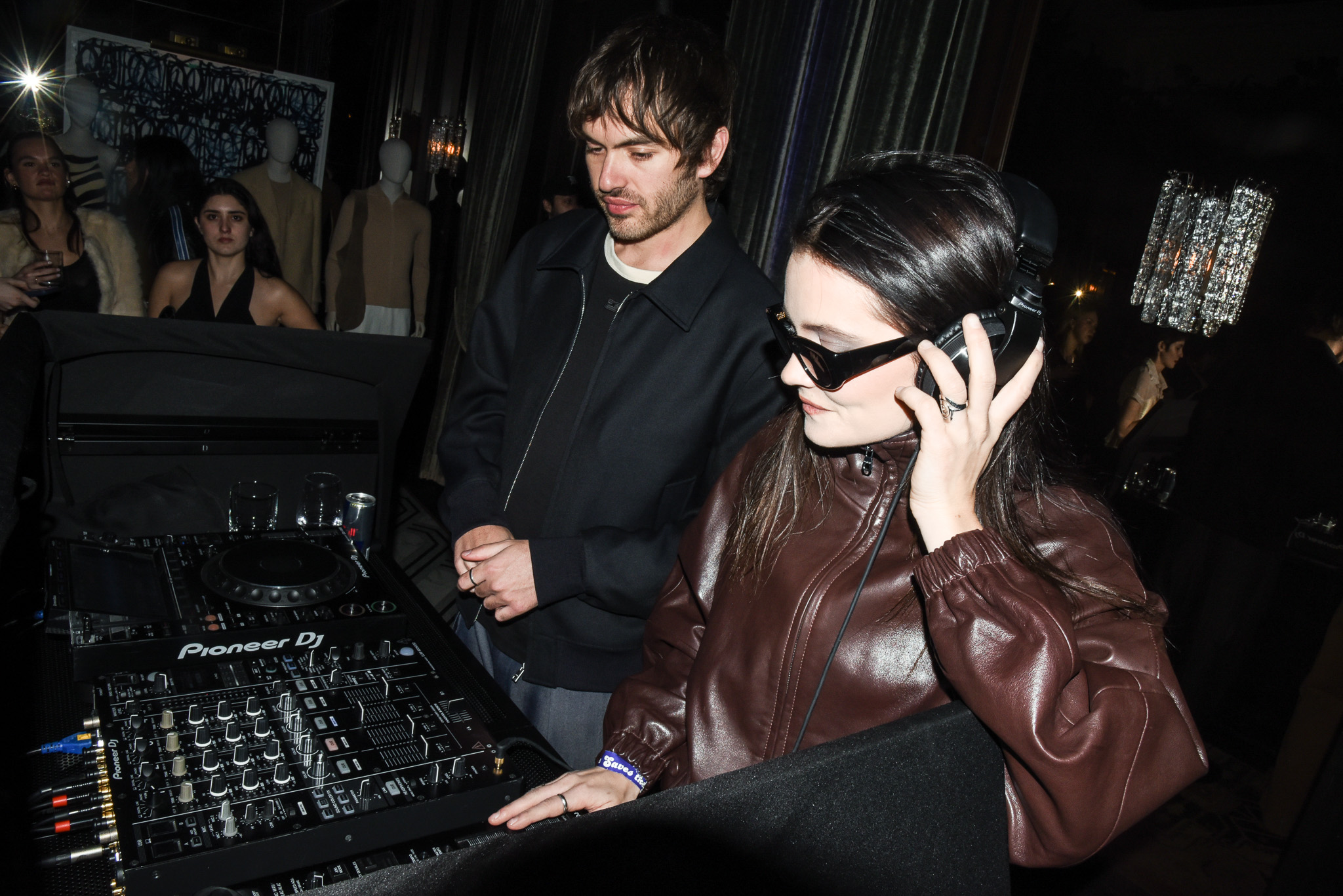

In Rick Alverson’s fourth feature, _Entertainment_ (2015), the indie writer-director makes yet another stand against the commoditised spectacle of modern moviemaking—but this time it’s far more mordant, far more direct. Following "anti-comedian" Neil Hamburger (brainchild of real-life comic Gregg Turkington), a character who could conceivably be the sweaty love-child of Tony Clifton and Simon Munnery, with a bit more weird thrown in, he spirals downward through the bars and dives of the American South touring his increasingly confrontational stand-up act. Off-stage he’s a shell; quiet, lost, forever leaving messages for an unseen daughter (whose existence is debatable). The film itself is a form of provocation, Alverson the provocateur re-plotting the line between audience and entertainer.
We sat down with Rick and talked about cinema’s place in society—and the next protest projects he's working on:
#### _What’s the kind of reaction that you’ve been getting from audiences on the festival circuit so far?_
It’s difficult for me to say. It’s been good. I mean, we haven’t released it yet. It’s coming out in the United States on 13 November.
#### _Do you expect a generally positive reaction, because it’s quite a confrontational film in a lot of ways?_
It’s supposed to be a destabilizing film. It’s supposed to be subtly confrontational. The politics are in the form of the thing—it’s meant to challenge audiences’ perception of both their viewing habits and their prerequisites for the relationship between them and the external world, including the media. I’d hope that it has enough potency to be destabilizing for some audiences—that would be a good thing.
#### _Was that always the intention, to create a film that discomforts your audience, to challenge their ‘passive viewing'?_
'Passive viewing' is something that’s happened in cinema over the years, but I think it’s been exacerbated by our habits and social media, as well as our increased ability to control our experience through digital platforms. I think that we increasingly want to be, and have been taught to be, expecting validation from our entertainment, from audio-visual media, something that operates by the rules that are already in place.
There’s almost a corporate pact that what we’ll be imbibing will be serving our interests. Now, of course we both know that this is dramatically in contrast to our organic experience. The world around us has anything but our interests in mind, and I think that that relationship is increasingly lost. It’s important that it’s reflected in cinema, and that essentially as opposed to the viewer being told certain things, the viewer is both indicted by what they’re seeing and compromised by it—that they’re an active participant in the unpacking of what they’re viewing. In American popular cinema, that’s a violation of that corporate pact. The best consumer is a passive consumer—active consumers take to the streets (laughs).
#### _Which filmmakers would you say are doing things differently, confronting audiences—making films that aren’t commodity for passive consumption?_
In the US, Josh and Ben Safdie are definitely working in that realm. In Latin America, Lisandro Alonso and Carlos Reygadas work in that world, and in Europe Bruno Dumont and Michael Haneke of the past decade have done incredibly important work in exploring the audience-screen relationship.
#### _Okay, so is the daughter character in the film real?_
Well I can’t answer that (laughing). You know, there’s an intentional obstruction to clarity there that’s necessary for the thing to have some resonance.
#### _I’m glad you said that. How did the clown character come about?_
Oh, the clown character. So part of the concept here is that I have a real aversion to metaphors in cinema. I think that they operate best in literary narratives, and I don’t use dialogue for the narrative. I think more tonally and for us, to be able to generate meaning in the film, it can be very destructive to the experience. I think that metaphors, while they’re necessary to obscure messaging in totalitarian cultures, in the quote unquote "free world,” they’re kind of bankrupt. But that having been said, they’re a grammar that everybody \[understands\].
It’s very safe for somebody to drive needs through symbolism in films, so we wanted to sort of stack the movie with these tropes and stereotypes and symbolism and metaphors, as an entry point for the fluency of that particular grammar. And then essentially, once the audience goes in and watches the thing become dysfunctional, with the spectator inside the film, the clown character is one of these exaggerated fruitions. Whether it’s the American West and the deserts, as depicted in the movie, or it’s the vaudevillian entertainment kind of clown character, these things are meant to push you to the brink, to watch what it does.
#### _What projects are you working on next and are they in a similar vein to your previous work?_
I’m developing two, one of them with Ty Sheridan (who played the clown) as the lead, for a movie set in the American Pacific Northwest, 1953. That’s loosely based on the fall of Dr. Walter Freeman, a popular lobotomist in America. It also deals with the burgeoning new age culture at the time.
The other project I’m working on which is in development is called _A Well Dressed Man_. We’re casting right now and that's about the genesis of the Ku Klux Klan and the tumult of the post-war reconstruction era, something that was only covered in the DW Griffith's film _Birth of a Nation_. Any student of film knows that the politics of that were very problematic.
#### _So this will be a counter to DW Griffith's_ Birth of a Nation_?_
Yeah, a form of rebuttal—after all of these years, the film shouldn’t just operate in the propagandistic fashion, on either side of any argument or political interest. The idea of moral reckoning in movies is problematic because essentially it can relieve the audience of the burden of their culpability in what they’ve seen and both their enjoyment of that and their participation.
#### _It sounds like a very timely film particularly with what’s happening in the US at the moment. Was that part of the inspiration for it, or is it something you’ve been working on for a long time?_
I live in Richmond, Virginia which was the capital of the Confederacy during the civil war and I’ve lived here for 20 years—there’s a sort of resonant element of things that were begun with emancipation after the civil war and really never finished. This is something that I’ve seen on a daily basis; this disconnect from the idea of racial unification and the reality of that thing. I’ve been working on this project for six years and you have to be trepidatious about the subject matter, because you’re sort of in contrast to the easy afternoon or evening in front of the screen.
#### _Have you struggled to find funding because of the subject matter?_
It’s been hard work, yes. We have a few brave folks that are on and we’re looking for a few more. I think particularly the idea of certain cultures holding onto certain resources, the idea of inching for national ownership over lands or the emancipation was a form of regional immigration; a huge influx that tested human capacity for inclusion in a very quick, dramatic moment. There are echoes of that with what Europe’s facing with immigrants today, that are relevant to these sort of things. We like to call particular events in certain pockets of race or class, but I think it’s much more universal than that. It does seem timely and I hope that it gets made.
#### _It sounds like a great project. Since this film is called_ Entertainment_, and your last was called_ The Comedy_—and this is the BFI London Film Festival— do you watch a lot of British comedy?_
I mean, I understand British comedy more than I’ve understood American comedy…
#### _What do you mean by that?_
When the first _Alan Partridge_ stuff was out, I enjoyed that, and the original _Office_ as well. I grew up on _Monty Python_, and I mean I understood Abbott and Costello to some degree—but watching a medieval knight systematically deprived of all of his limbs sort of made a lot of elemental sense to me. But you know, I’m not really a comedy fan. I don’t really follow the world of comedy and I think what Gregg Turkington does is something that I understand. It deals with the problems of the performance and it makes it very clear what’s going on. It doesn’t make it a seamless problematic spectacle; it’s something that’s very elegant, much like the flailing medieval knight deprived of his respective limbs.
 
In Rick Alverson’s fourth feature, _Entertainment_ (2015), the indie writer-director makes yet another stand against the commoditised spectacle of modern moviemaking—but this time it’s far more mordant, far more direct. Following "anti-comedian" Neil Hamburger (brainchild of real-life comic Gregg Turkington), a character who could conceivably be the sweaty love-child of Tony Clifton and Simon Munnery, with a bit more weird thrown in, he spirals downward through the bars and dives of the American South touring his increasingly confrontational stand-up act. Off-stage he’s a shell; quiet, lost, forever leaving messages for an unseen daughter (whose existence is debatable). The film itself is a form of provocation, Alverson the provocateur re-plotting the line between audience and entertainer.
We sat down with Rick and talked about cinema’s place in society—and the next protest projects he's working on:
#### _What’s the kind of reaction that you’ve been getting from audiences on the festival circuit so far?_
It’s difficult for me to say. It’s been good. I mean, we haven’t released it yet. It’s coming out in the United States on 13 November.
#### _Do you expect a generally positive reaction, because it’s quite a confrontational film in a lot of ways?_
It’s supposed to be a destabilizing film. It’s supposed to be subtly confrontational. The politics are in the form of the thing—it’s meant to challenge audiences’ perception of both their viewing habits and their prerequisites for the relationship between them and the external world, including the media. I’d hope that it has enough potency to be destabilizing for some audiences—that would be a good thing.
#### _Was that always the intention, to create a film that discomforts your audience, to challenge their ‘passive viewing'?_
'Passive viewing' is something that’s happened in cinema over the years, but I think it’s been exacerbated by our habits and social media, as well as our increased ability to control our experience through digital platforms. I think that we increasingly want to be, and have been taught to be, expecting validation from our entertainment, from audio-visual media, something that operates by the rules that are already in place.
There’s almost a corporate pact that what we’ll be imbibing will be serving our interests. Now, of course we both know that this is dramatically in contrast to our organic experience. The world around us has anything but our interests in mind, and I think that that relationship is increasingly lost. It’s important that it’s reflected in cinema, and that essentially as opposed to the viewer being told certain things, the viewer is both indicted by what they’re seeing and compromised by it—that they’re an active participant in the unpacking of what they’re viewing. In American popular cinema, that’s a violation of that corporate pact. The best consumer is a passive consumer—active consumers take to the streets (laughs).
#### _Which filmmakers would you say are doing things differently, confronting audiences—making films that aren’t commodity for passive consumption?_
In the US, Josh and Ben Safdie are definitely working in that realm. In Latin America, Lisandro Alonso and Carlos Reygadas work in that world, and in Europe Bruno Dumont and Michael Haneke of the past decade have done incredibly important work in exploring the audience-screen relationship.
#### _Okay, so is the daughter character in the film real?_
Well I can’t answer that (laughing). You know, there’s an intentional obstruction to clarity there that’s necessary for the thing to have some resonance.
#### _I’m glad you said that. How did the clown character come about?_
Oh, the clown character. So part of the concept here is that I have a real aversion to metaphors in cinema. I think that they operate best in literary narratives, and I don’t use dialogue for the narrative. I think more tonally and for us, to be able to generate meaning in the film, it can be very destructive to the experience. I think that metaphors, while they’re necessary to obscure messaging in totalitarian cultures, in the quote unquote "free world,” they’re kind of bankrupt. But that having been said, they’re a grammar that everybody \[understands\].
It’s very safe for somebody to drive needs through symbolism in films, so we wanted to sort of stack the movie with these tropes and stereotypes and symbolism and metaphors, as an entry point for the fluency of that particular grammar. And then essentially, once the audience goes in and watches the thing become dysfunctional, with the spectator inside the film, the clown character is one of these exaggerated fruitions. Whether it’s the American West and the deserts, as depicted in the movie, or it’s the vaudevillian entertainment kind of clown character, these things are meant to push you to the brink, to watch what it does.
#### _What projects are you working on next and are they in a similar vein to your previous work?_
I’m developing two, one of them with Ty Sheridan (who played the clown) as the lead, for a movie set in the American Pacific Northwest, 1953. That’s loosely based on the fall of Dr. Walter Freeman, a popular lobotomist in America. It also deals with the burgeoning new age culture at the time.
The other project I’m working on which is in development is called _A Well Dressed Man_. We’re casting right now and that's about the genesis of the Ku Klux Klan and the tumult of the post-war reconstruction era, something that was only covered in the DW Griffith's film _Birth of a Nation_. Any student of film knows that the politics of that were very problematic.
#### _So this will be a counter to DW Griffith's_ Birth of a Nation_?_
Yeah, a form of rebuttal—after all of these years, the film shouldn’t just operate in the propagandistic fashion, on either side of any argument or political interest. The idea of moral reckoning in movies is problematic because essentially it can relieve the audience of the burden of their culpability in what they’ve seen and both their enjoyment of that and their participation.
#### _It sounds like a very timely film particularly with what’s happening in the US at the moment. Was that part of the inspiration for it, or is it something you’ve been working on for a long time?_
I live in Richmond, Virginia which was the capital of the Confederacy during the civil war and I’ve lived here for 20 years—there’s a sort of resonant element of things that were begun with emancipation after the civil war and really never finished. This is something that I’ve seen on a daily basis; this disconnect from the idea of racial unification and the reality of that thing. I’ve been working on this project for six years and you have to be trepidatious about the subject matter, because you’re sort of in contrast to the easy afternoon or evening in front of the screen.
#### _Have you struggled to find funding because of the subject matter?_
It’s been hard work, yes. We have a few brave folks that are on and we’re looking for a few more. I think particularly the idea of certain cultures holding onto certain resources, the idea of inching for national ownership over lands or the emancipation was a form of regional immigration; a huge influx that tested human capacity for inclusion in a very quick, dramatic moment. There are echoes of that with what Europe’s facing with immigrants today, that are relevant to these sort of things. We like to call particular events in certain pockets of race or class, but I think it’s much more universal than that. It does seem timely and I hope that it gets made.
#### _It sounds like a great project. Since this film is called_ Entertainment_, and your last was called_ The Comedy_—and this is the BFI London Film Festival— do you watch a lot of British comedy?_
I mean, I understand British comedy more than I’ve understood American comedy…
#### _What do you mean by that?_
When the first _Alan Partridge_ stuff was out, I enjoyed that, and the original _Office_ as well. I grew up on _Monty Python_, and I mean I understood Abbott and Costello to some degree—but watching a medieval knight systematically deprived of all of his limbs sort of made a lot of elemental sense to me. But you know, I’m not really a comedy fan. I don’t really follow the world of comedy and I think what Gregg Turkington does is something that I understand. It deals with the problems of the performance and it makes it very clear what’s going on. It doesn’t make it a seamless problematic spectacle; it’s something that’s very elegant, much like the flailing medieval knight deprived of his respective limbs.

In Rick Alverson’s fourth feature, _Entertainment_ (2015), the indie writer-director makes yet another stand against the commoditised spectacle of modern moviemaking—but this time it’s far more mordant, far more direct. Following "anti-comedian" Neil Hamburger (brainchild of real-life comic Gregg Turkington), a character who could conceivably be the sweaty love-child of Tony Clifton and Simon Munnery, with a bit more weird thrown in, he spirals downward through the bars and dives of the American South touring his increasingly confrontational stand-up act. Off-stage he’s a shell; quiet, lost, forever leaving messages for an unseen daughter (whose existence is debatable). The film itself is a form of provocation, Alverson the provocateur re-plotting the line between audience and entertainer.
We sat down with Rick and talked about cinema’s place in society—and the next protest projects he's working on:
#### _What’s the kind of reaction that you’ve been getting from audiences on the festival circuit so far?_
It’s difficult for me to say. It’s been good. I mean, we haven’t released it yet. It’s coming out in the United States on 13 November.
#### _Do you expect a generally positive reaction, because it’s quite a confrontational film in a lot of ways?_
It’s supposed to be a destabilizing film. It’s supposed to be subtly confrontational. The politics are in the form of the thing—it’s meant to challenge audiences’ perception of both their viewing habits and their prerequisites for the relationship between them and the external world, including the media. I’d hope that it has enough potency to be destabilizing for some audiences—that would be a good thing.
#### _Was that always the intention, to create a film that discomforts your audience, to challenge their ‘passive viewing'?_
'Passive viewing' is something that’s happened in cinema over the years, but I think it’s been exacerbated by our habits and social media, as well as our increased ability to control our experience through digital platforms. I think that we increasingly want to be, and have been taught to be, expecting validation from our entertainment, from audio-visual media, something that operates by the rules that are already in place.
There’s almost a corporate pact that what we’ll be imbibing will be serving our interests. Now, of course we both know that this is dramatically in contrast to our organic experience. The world around us has anything but our interests in mind, and I think that that relationship is increasingly lost. It’s important that it’s reflected in cinema, and that essentially as opposed to the viewer being told certain things, the viewer is both indicted by what they’re seeing and compromised by it—that they’re an active participant in the unpacking of what they’re viewing. In American popular cinema, that’s a violation of that corporate pact. The best consumer is a passive consumer—active consumers take to the streets (laughs).
#### _Which filmmakers would you say are doing things differently, confronting audiences—making films that aren’t commodity for passive consumption?_
In the US, Josh and Ben Safdie are definitely working in that realm. In Latin America, Lisandro Alonso and Carlos Reygadas work in that world, and in Europe Bruno Dumont and Michael Haneke of the past decade have done incredibly important work in exploring the audience-screen relationship.
#### _Okay, so is the daughter character in the film real?_
Well I can’t answer that (laughing). You know, there’s an intentional obstruction to clarity there that’s necessary for the thing to have some resonance.
#### _I’m glad you said that. How did the clown character come about?_
Oh, the clown character. So part of the concept here is that I have a real aversion to metaphors in cinema. I think that they operate best in literary narratives, and I don’t use dialogue for the narrative. I think more tonally and for us, to be able to generate meaning in the film, it can be very destructive to the experience. I think that metaphors, while they’re necessary to obscure messaging in totalitarian cultures, in the quote unquote "free world,” they’re kind of bankrupt. But that having been said, they’re a grammar that everybody \[understands\].
It’s very safe for somebody to drive needs through symbolism in films, so we wanted to sort of stack the movie with these tropes and stereotypes and symbolism and metaphors, as an entry point for the fluency of that particular grammar. And then essentially, once the audience goes in and watches the thing become dysfunctional, with the spectator inside the film, the clown character is one of these exaggerated fruitions. Whether it’s the American West and the deserts, as depicted in the movie, or it’s the vaudevillian entertainment kind of clown character, these things are meant to push you to the brink, to watch what it does.
#### _What projects are you working on next and are they in a similar vein to your previous work?_
I’m developing two, one of them with Ty Sheridan (who played the clown) as the lead, for a movie set in the American Pacific Northwest, 1953. That’s loosely based on the fall of Dr. Walter Freeman, a popular lobotomist in America. It also deals with the burgeoning new age culture at the time.
The other project I’m working on which is in development is called _A Well Dressed Man_. We’re casting right now and that's about the genesis of the Ku Klux Klan and the tumult of the post-war reconstruction era, something that was only covered in the DW Griffith's film _Birth of a Nation_. Any student of film knows that the politics of that were very problematic.
#### _So this will be a counter to DW Griffith's_ Birth of a Nation_?_
Yeah, a form of rebuttal—after all of these years, the film shouldn’t just operate in the propagandistic fashion, on either side of any argument or political interest. The idea of moral reckoning in movies is problematic because essentially it can relieve the audience of the burden of their culpability in what they’ve seen and both their enjoyment of that and their participation.
#### _It sounds like a very timely film particularly with what’s happening in the US at the moment. Was that part of the inspiration for it, or is it something you’ve been working on for a long time?_
I live in Richmond, Virginia which was the capital of the Confederacy during the civil war and I’ve lived here for 20 years—there’s a sort of resonant element of things that were begun with emancipation after the civil war and really never finished. This is something that I’ve seen on a daily basis; this disconnect from the idea of racial unification and the reality of that thing. I’ve been working on this project for six years and you have to be trepidatious about the subject matter, because you’re sort of in contrast to the easy afternoon or evening in front of the screen.
#### _Have you struggled to find funding because of the subject matter?_
It’s been hard work, yes. We have a few brave folks that are on and we’re looking for a few more. I think particularly the idea of certain cultures holding onto certain resources, the idea of inching for national ownership over lands or the emancipation was a form of regional immigration; a huge influx that tested human capacity for inclusion in a very quick, dramatic moment. There are echoes of that with what Europe’s facing with immigrants today, that are relevant to these sort of things. We like to call particular events in certain pockets of race or class, but I think it’s much more universal than that. It does seem timely and I hope that it gets made.
#### _It sounds like a great project. Since this film is called_ Entertainment_, and your last was called_ The Comedy_—and this is the BFI London Film Festival— do you watch a lot of British comedy?_
I mean, I understand British comedy more than I’ve understood American comedy…
#### _What do you mean by that?_
When the first _Alan Partridge_ stuff was out, I enjoyed that, and the original _Office_ as well. I grew up on _Monty Python_, and I mean I understood Abbott and Costello to some degree—but watching a medieval knight systematically deprived of all of his limbs sort of made a lot of elemental sense to me. But you know, I’m not really a comedy fan. I don’t really follow the world of comedy and I think what Gregg Turkington does is something that I understand. It deals with the problems of the performance and it makes it very clear what’s going on. It doesn’t make it a seamless problematic spectacle; it’s something that’s very elegant, much like the flailing medieval knight deprived of his respective limbs.





.jpg)












